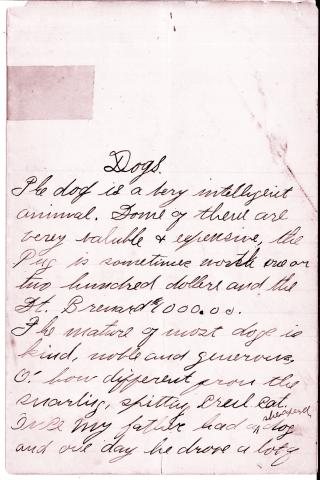
Annotations from the Archive: Back to School
August in Nebraska is a hot and hazy, lazy time of year. Slow dewy mornings give way to airless afternoons spent, if one is lucky, in languid repose in the whispering shade of a cottonwood tree, the daylight stretching out until the sun dips, finally, below the western-most prairie hills and the blue hour deepens to black. During these afternoons, summer seems endless, but it is then that children are jarred from summer reveries and returned to school.
In just such a moment, Willa Cather’s earliest known letter was written at the end of August 1888, to Helen Stowell, a family friend who had moved to California with her husband and daughter. Cather bemoans her return to school, and with both her characteristic insight and poor spelling, she writes, “School begins Monday & I suppose I shall go though I dont feel boyant over the prospect, I have grown so attached to my work & place in the office & to my little labratory & dissecting outfit & my stuffed animals it is hard for me to leave them. Then here I am ‘Miss Cather’ & govern, there I am a child & am governed. That makes a great difference with frail humanity.”

The rest of the letter, which is a part of the Willa Cather Pioneer Memorial collection at the National Willa Cather Center, reads like a time capsule of small-town summers during high school, filled with swimming, picnics, and the love affairs and late-night intrigues of a circle of friends. And yet Cather's words are so serious that we must remind ourselves of the author: a fifteen year old girl, caught between the worlds of adults and children, her own earnest and curious hobbies and the casual judgment of small-town tongues.
Cather’s letter to Helen Stowell reminds a reader of the classic “How I Spent My Summer Vacation” writing assignment. “Theme-writing” was a classroom staple long before a young Willa Cather ever wandered into Miss Gertrude Sherer’s class in Red Cloud, and she may have begun writing themes under the watchful eyes of more educated family members. Her earliest surviving writing example is a theme entitled “Dogs,” available on microfilm at the NWCC (and housed within History Nebraska’s Gere Family Collection).

Likely written around the time the Cather family moved into Red Cloud during the spring of 1885, “Dogs” was not highly regarded; at the bottom of the essay, the word “Defeated” is written and underscored.
“Dogs”
The dog is a very intelligent animal. Some of them are very valuable & expensive, the Pug is sometimes worth one or two hundred dollars and the St. Brenard $1000.00.
The nature of most dogs is kind, noble and generous. O! how different from the snarling, spitting, crul cat. Once my father had a shepherd dog and one day he drove a lot of sheep into a fence corner and said “Milo keepe ‘em safe”. then he went to do some work, forgot the sheep and went home. That night the dog did not come when he was called and was missed for 3 days. At last papa thought of the sheep and hastened to the field. And there, faithful to his trust was the poor old dog, half starved but still paceing to and fro before the half wild sheep. Newfoundland dogs are also famous for their way of saving the lives of people when drownding. And the St. Brenards are often trained in Switzerland to find travelers in the snow and carry them to a place of safety.
Pugs & Poodles are famous for nothing, unless it is their expensive price which sometimes amount to one thousand dollars.
Lord Byron, one of our greatest poets wrote a beautiful elegy on a dog, who ever wrote any thing on a cat.
Did you ever see a tall massive dog with curly hair bright eyes and a knowing air?
Did you ever see a poor thin scraggy cat, with dirty hair dull green eyes and drooping tail.
If so I leave it to your common sense to answer for I know you will say the noble majestic dog.
Not all her essays would be failures. Perhaps Cather's most important theme was “Concerning Thomas Carlyle.” Written while at the University of Nebraska, it was printed in the student publication The Hesperian, and subsequently in the Nebraska State Journal. Writing to editor Will Owen Jones for publication in the Journal in 1927, Cather recalls, “I opened the Sunday Journal and saw . . . an essay on ‘Some Personal Characteristics of Thomas Carlyle’ which Professor Hunt had given you to publish, quite without my knowledge. . . . But what youthful vanity can be unaffected by the sight of itself in print! It has a kind of hypnotic effect. I still vaguely remember that essay, and it was a splendid example of the kind of writing I most dislike; very florid and full of high-flown figures of speech,—and, if I recall aright, not a single 'Personal Characteristic' of the gentleman was mentioned!” The theme read, in part:
Perhaps no man who has ever stood before the public as an English author was thoroughly un-English as Thomas Carlyle. His life, his habits, and his literature were most decidedly German. The mansion on Piccadilly, the sedate tea parties, the literary clubs, and even the coveted tomb in old Westminster, so dear to the heart of every Englishman, were things of no moment to Carlyle. He was a recluse, not that he had any aversion for men, but that he loved his books and loved Nature better. He saw little of society, yet, though he never bent his knee to it, he never trampled upon its laws. He was merely indifferent to it, for he was one of the few men who can live utterly independent of it, while those who condemn it most severely, cling to it as the only thing which can give them zest or ambition enough to live. He respected social laws, for they are the outgrowth of man's honest sentiments of what is best to be done in his conduct toward his fellows. He revered any production of the hand or of the mind of man, be it some old rune cut upon stone in an English forest, or a social code which allotted to his higher, stronger nature and passions the same sphere of action as to every coal heaver on the street of London. He said but little of the wrongs which he himself suffered. He bore no sense of enmity toward any one; he only pitied, with all the strength of his great heart, pitied everything that lived.
But Cather first remarked on Carlyle in Red Cloud, in another theme, written for another occasion: her high school graduation. In that address, “Superstition Vs. Investigation,” given from the Red Cloud Opera House stage nearly a year before she would first see her name in newsprint, she still burns with scientific ambition and, perhaps, some small amount of righteous indignation. Not even two years had passed since Cather confided to Mrs. Stowell about her reluctance to give up scientific inquiry in the self-styled laboratory behind her father’s office to return to school; here, she defends just such an amateur scientist against criticisms that were almost certainly levelled against Cather herself:
All human history is a record of an emigration, an exodus from barbarism to civilization; from the very outset of this pilgrimage of humanity, superstition and investigation have been contending for mastery. Since investigation first led man forth on that great search for truth which has prompted all his progress, superstition, the stern Pharoah of his former bondage, has followed him, retarding every step of advancement. . . . Worship as defined by Carlyle is unmeasured wonder, but there are two kinds of wonder, that born of fear and that of admiration; slavish fear is never reverence. . . .
It is the most sacred right of man to investigate; we paid dearly for it in Eden; we have been shedding our heart's blood for it ever since. It is ours; we have bought it with a price.
Scientific investigation is the hope of our age, as it must precede all progress; and yet upon every hand we hear the objections to its pursuit. The boy who spends his time among the stones and flowers is a trifler, and if he tries with bungling attempt to pierce the mystery of animal life he is cruel. Of course if he becomes a great anatomist or a brilliant naturalist, his cruelties are forgotten or forgiven him; the world is very cautious, but it is generally safe to admire a man who has succeeded. We do not with-hold from a few great scientists the right of the hospital, the post mortem, or experimenting with animal life, but we are prone to think the right of experimenting with life too sacred a thing to be placed in the hands of inexperienced persons. Nevertheless, if we bar our novices from advancement, whence shall come our experts?
Indeed. And so we write, sometimes well and other times, not well. It’s easy to be critical and yet, would any of us have read “Dogs” and recognized a certain genius in the writer? Cather herself felt bound to a career in science instead of writing. But what is essay writing, but the same sort of observation and reflection, modification and investigation? Though the work is done with a pen rather than a scalpel, mightn’t a “bungling attempt” at characterization or description by a novice also be perceived as cruel experimentation? Perhaps, just as a writer who approaches the page with curiosity instead of ambition might be disregarded by some as a dabbler, “a trifler.” But there is something that Cather recognizes early—perhaps as soon as “Defeated” was written and underscored at the bottom of “Dogs”: that effort, even unsuccessful effort, can have value if only you continue to reflect, improve, learn, discover, and grow.
How did you spend your summer vacation?
NOTE: While brilliant in many things, Willa Cather was not an expert speller, especially in her early years, so in keeping with other scholarship these transcriptions include her original misspellings.
